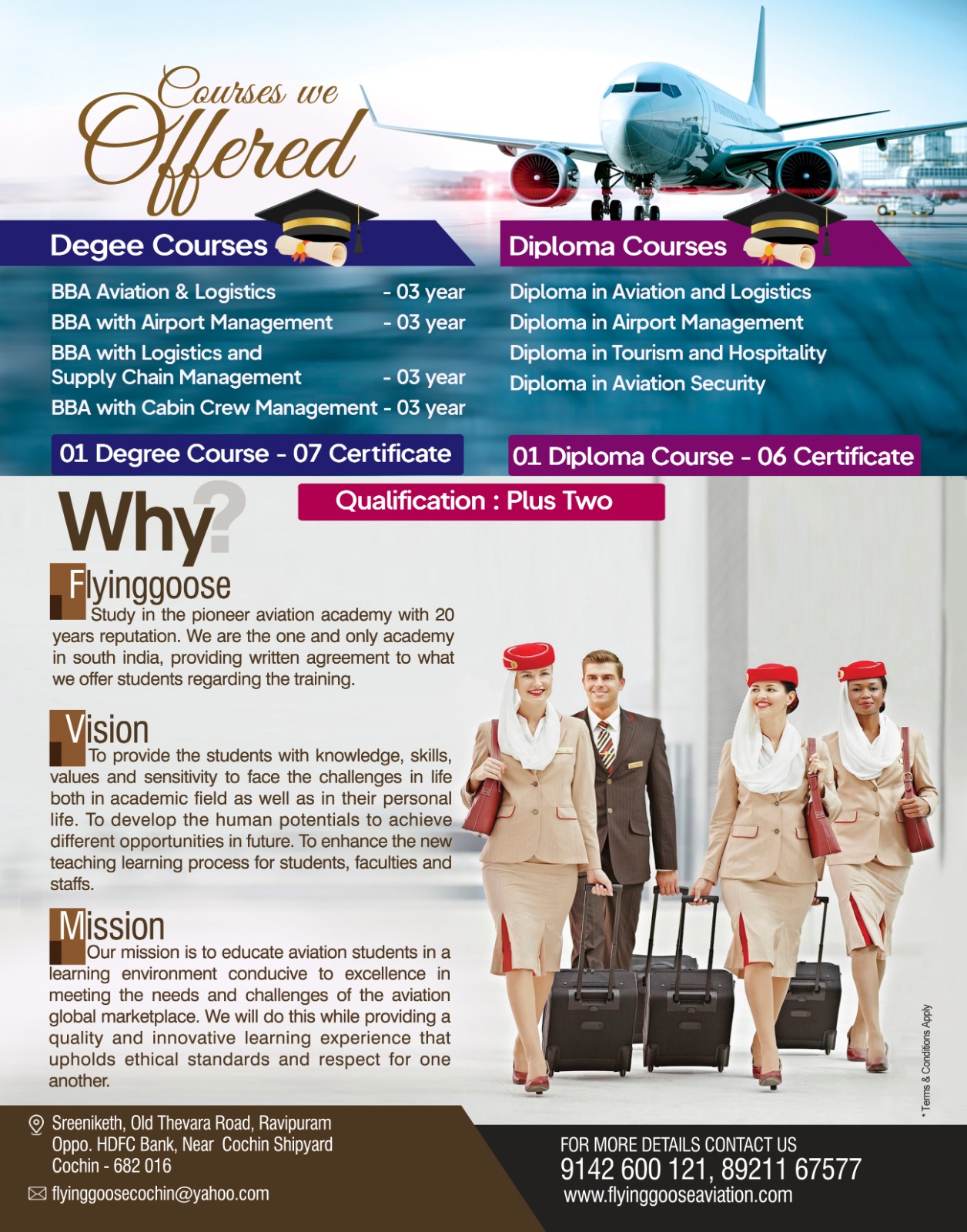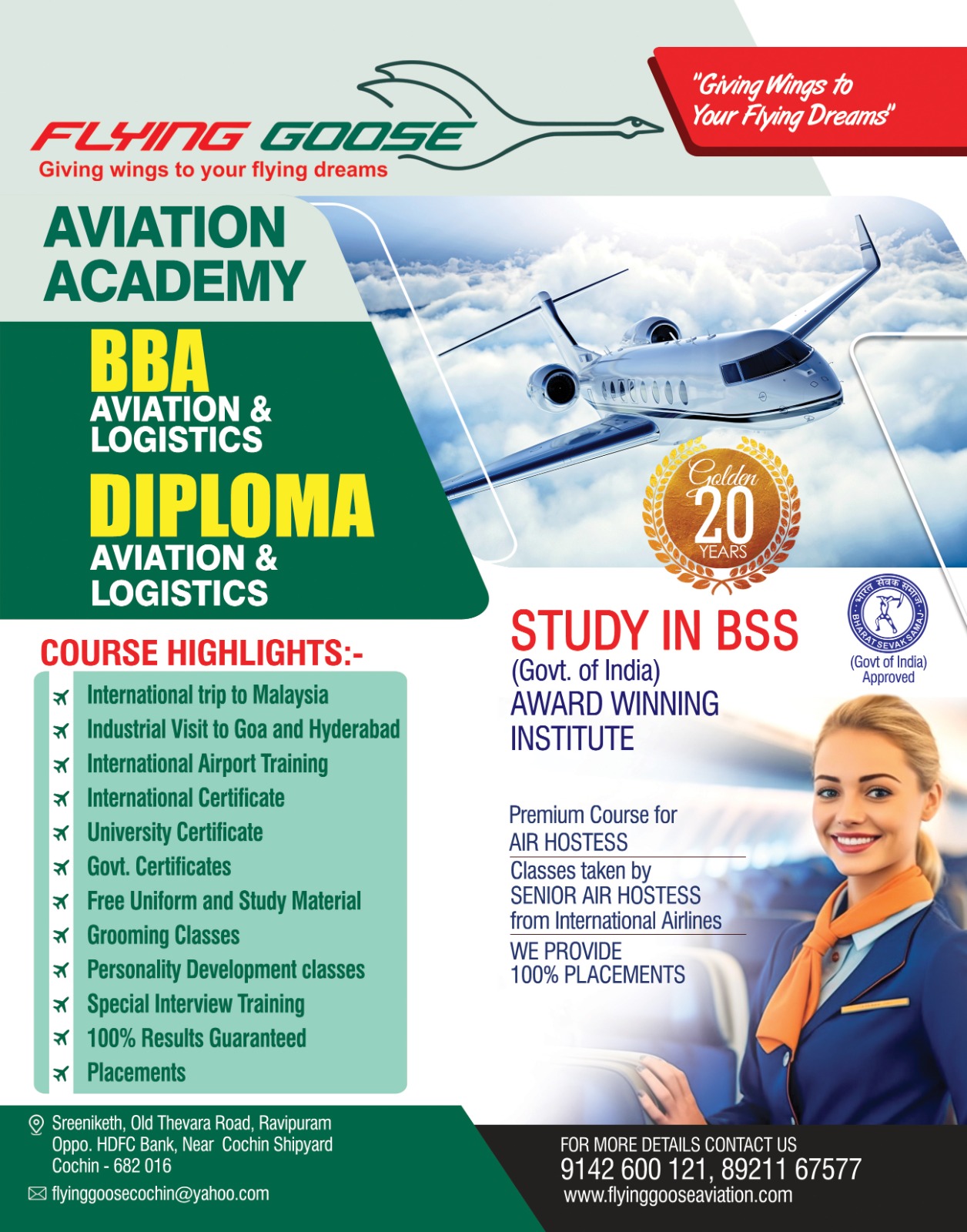Flying Goose Aviation Academy
Ravipuram - Ernakulam
Products & Services:
Flying Goose Aviation Academy, Ravipuram, Ernakulam, Reviews, Contact number, Phone number, Address, More..
Since : 2004
Ravipuram - Ernakulam
Products & Services:
Flying Goose Aviation Academy, Ravipuram, Ernakulam, Reviews, Contact number, Phone number, Address, More..
Since : 2004
Institutes for cabin crew are specialized training centers that provide aspiring flight attendants with the necessary skills and knowledge to succeed in the aviation industry. These institutes offer comprehensive courses covering various aspects of cabin crew responsibilities, including safety procedures, customer service, grooming, and communication skills. The aim is to prepare students for the demands and expectations of a career in the skies.
Ernakulam, a bustling city in Kerala, is home to several prestigious institutes that offer top-notch cabin crew training. Some of the renowned institutes include Frankfinn Institute of Air Hostess Training, Aptech Aviation Academy, Speedwings Aviation Academy, and Remo International College of Aviation. These institutes are known for their rigorous training programs, experienced faculty, and strong industry connections, making them ideal choices for anyone looking to pursue a career as a cabin crew member.
These institutes provide various course options to cater to different needs and schedules. Students can choose from full-time, part-time, and weekend courses, ensuring flexibility and accessibility. Additionally, many institutes offer placement support and career counseling, helping students to secure jobs in reputed airlines upon completion of their training.
Students expect a comprehensive curriculum that covers all essential aspects of cabin crew duties. This includes training in safety and emergency procedures, in-flight service, customer handling, first aid, and personal grooming. A well-structured curriculum ensures that students are well-prepared to handle the diverse challenges of the job.
The quality of training is significantly influenced by the expertise of the faculty. Institutes with experienced instructors who have extensive industry experience are highly valued. These instructors can provide practical insights, mentorship, and guidance, which are crucial for the professional development of aspiring cabin crew members.
Hands-on practical training is a vital component of cabin crew courses. Students expect to undergo rigorous practical sessions, including simulated flight scenarios, emergency drills, and real-time service exercises. Practical training helps students gain confidence and proficiency in their roles, ensuring they are job-ready upon graduation.
Strong industry connections and placement support are critical expectations from cabin crew institutes. Institutes that have partnerships with leading airlines and aviation companies can offer students better internship opportunities, on-the-job training, and job placements. Effective placement support, including resume building, interview preparation, and career counseling, is essential for helping students launch their careers successfully.
Access to modern facilities and resources enhances the learning experience. Students expect well-equipped classrooms, training simulators, grooming labs, and up-to-date training materials. Institutes that invest in state-of-the-art infrastructure provide a conducive environment for effective learning and skill development.
To enroll in a cabin crew training program, candidates typically need to have completed higher secondary education (12th grade). Good communication skills, a pleasing personality, and basic proficiency in English are usually required. Some institutes may also have specific age, height, and fitness criteria.
The duration of cabin crew training programs generally ranges from 6 months to 1 year, depending on the institute and the specific course structure. Some programs may offer accelerated options or allow students to extend the duration if they are studying part-time.
Graduates of cabin crew training programs can pursue various roles in the aviation industry, primarily as flight attendants or cabin crew members. Other career opportunities include ground staff positions, customer service roles at airports, and positions in hospitality and tourism. The aviation sector offers competitive salaries, travel benefits, and opportunities for career advancement.
While the theoretical components of cabin crew training programs can be delivered online, practical training is essential and must be conducted in person. Some institutes may offer hybrid programs that combine online coursework with on-campus practical training. This approach allows students to benefit from flexible learning while gaining the hands-on experience necessary for their roles.
The cost of cabin crew training programs can vary widely depending on the institution and the course. Tuition fees generally range from INR 50,000 to INR 2,00,000. Some institutes may offer financial aid, scholarships, or installment payment options to help manage the costs. It is advisable to check with individual institutes for detailed fee structures and available financial assistance.

Ernakulam, Ravipuram

Ernakulam, Ravipuram